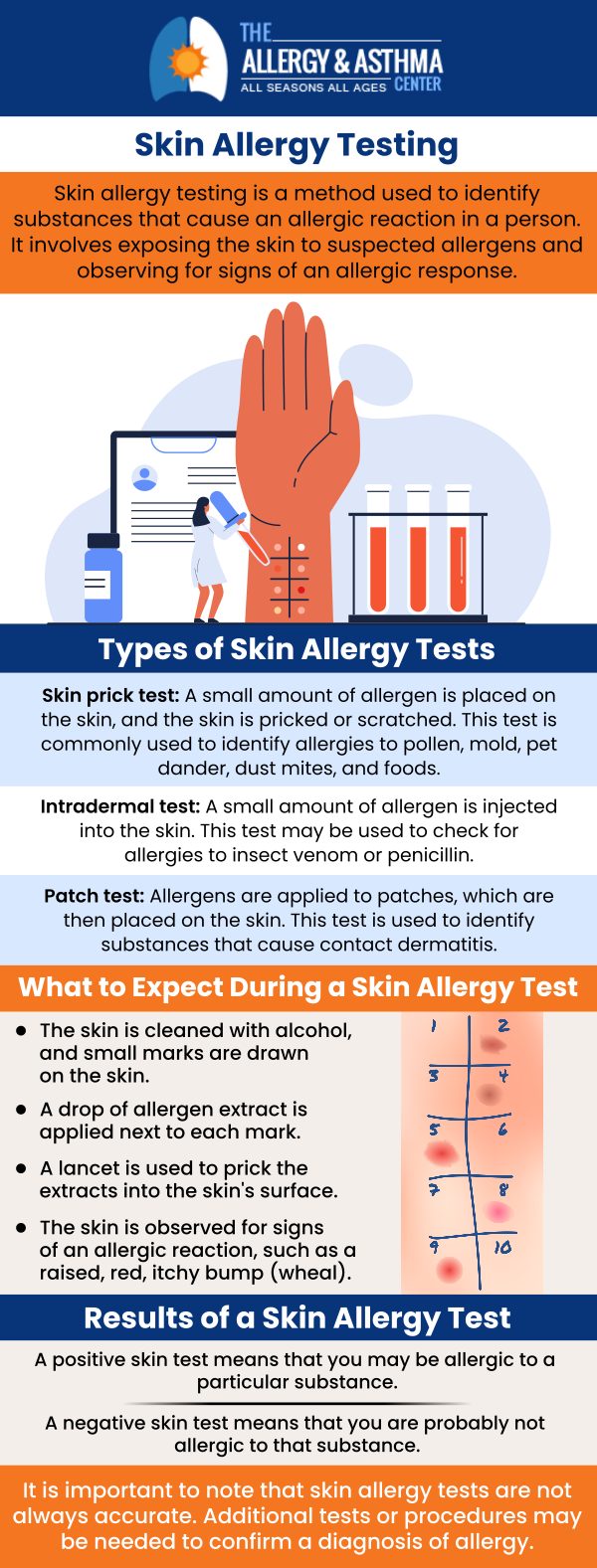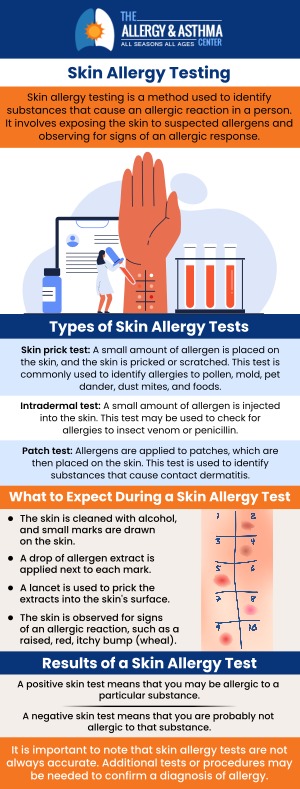Skin Allergy Test Questions and Answers
Do you have a skin allergy? Talk to our professional allergists at The Allergy & Asthma Center and get comprehensive treatment. For more information, contact us or book an appointment online. We have convenient locations to serve you in Lawrenceville GA, Atlanta GA, and Conyers GA.




Table of Contents:
What tests are done to diagnose skin allergies?
Does a dermatologist or allergist treat eczema?
Can a dermatologist test for skin allergies?
How do you treat skin allergies?
Skin allergies occur when an allergen comes into direct contact with the skin. The immune system identifies and overreacts to the intruding allergen, resulting in a reaction on the skin surface. The reaction is commonly a red, an itchy rash, and may include bumps or small blisters. There are several types of tests that can be performed to diagnose an allergy, and the most common are blood tests and skin allergy tests. Skin tests however are the preferred method by most trained allergists, as they are commonly more accurate, and results are often within 15 to 30 minutes.
Your allergist will determine which type of test will be the right one to use, based on several factors. Factors such as your symptoms, occupational or environmental exposures, your age, eating habits, and even certain hobbies can play a role.
An accurate diagnosis helps the allergist decide what kind of therapies or allergy management plan will be most effective. In addition to blood tests and skin prick tests, an intradermal test can be used to detect an allergy to things like insect stings or allergies to penicillin. With an intradermal test, an allergist will inject a small amount of the allergen under the skin.
Another type of test commonly used by allergists is called a patch test. This test is used to investigate the cause of contact dermatitis. With the patch test, a small amount of a possible allergen is placed on a small metal disk that is taped to the skin, which remains on the skin for 48 hours. During the 48-hour period, the patient is monitored for any reactions.
Contact or atopic dermatitis is a type of eczema that can be caused when the skin comes in contact with an allergen. Though it can sometimes be confusing as to which type of medical professional to consult if you suffer from eczema or atopic dermatitis.
An allergist is a physician specifically trained to diagnose and treat conditions that appear suddenly, which can be a respiratory reaction or a skin reaction. These reactions can arise due to many different types of allergens.
On the other hand, a dermatologist specializes in diagnosing and treating conditions of the skin. Given that eczema is a condition of the skin, a visit to a dermatologist is a good idea if an eczema flare-up occurs.
The most common reasons people are referred to a dermatologist are to diagnose and treat acne, dry or oily skin, rashes, psoriasis, eczema, and pigmentation.
If a skin reaction takes time to occur and lasts for several days or longer, it may be a sign of allergic contact dermatitis or atopic dermatitis. These reactions commonly stem from the skin coming into direct contact with a substance.
Dermatologic reactions come from external exposure to an irritant, whereas an allergic reaction can come from an internal, or external exposure to an allergen.
If a reaction occurs on the skin, a dermatologist is able to determine the appropriate treatment and can differentiate if the cause is coming from an allergy, or another cause entirely. If the dermatologist cannot diagnose the underlying cause of the allergic reaction on the skin, they will refer the patient to an allergist.
A dermatologist is able to help a patient with allergic reactions on the skin, by suggesting products that are less likely to irritate the skin. An allergist will be able to provide medications to manage the allergy or provide immunotherapy to help reduce sensitivity to the substance that causes the reaction.
Our highly qualified medical professionals and board-certified allergists at the Allergy & Asthma Center take great pride in providing our community with relief from allergies. For more information, please contact us or book an online appointment to visit one of our clinics. We serve patients from Lawrenceville GA, Atlanta GA, Conyers GA, Suwanee GA, Duluth GA, Grayson GA, Decatur GA, Brookhaven GA, Lithonia GA and Covington GA.

Additional Allergy & Asthma Services
▸ Allergy Shots
▸ Allergy Testing
▸ Asthma
▸ Bronchodilators
▸ Drug Allergy
▸ Food Allergy
▸ Insect Allergy
▸ Nasal/Sinus Allergies
▸ Pediatric Allergy
▸ Pediatric Asthma
▸ Skin Allergy
▸ Spring Allergies




